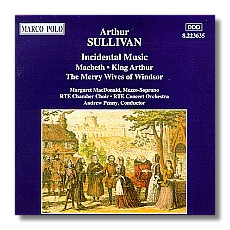
The Internet's Premier Classical Music Source
Related Links
- Latest Reviews
- More Reviews
-
By Composer
-
Collections
DVD & Blu-ray
Books
Concert Reviews
Articles/Interviews
Software
Audio
Search Amazon
Recommended Links
Site News
 CD Review
CD Review
Arthur Sullivan

Ballet Music
- L'Ile enchantée
- Thespis - Ballet Music
RTÉ Concert Orchestra, Dublin/Andrew Penny
Marco Polo 8.223460


Incidental Music
- Macbeth
- King Arthur
- The Merry Wives of Windsor
Margaret MacDonald, mezzo-soprano
RTÉ Chamber Choir
RTÉ Concert Orchestra, Dublin/Andrew Penny
Marco Polo 8.223635
Other than for musicals, live theater seems to have abandoned the idea of combining music and plays, thus cutting off another source of income for composers and musicians. It also cut short a grand tradition of incidental music: Beethoven's Egmont, Coriolan, König Stefan, and Ruinen von Athen; Schubert's Rosamunde; Mendelssohn's Midsummer Night's Dream; Bizet's L'Arlésienne; Grieg's Peer Gynt; Elgar's Grania and Diarmid and King Arthur; Copland's Quiet City; the works of Sullivan recorded here.
I love Gilbert and Sullivan (excepting The Gondoliers and The Grand Duke) and even worked as a theater electrician in a G & S repertory company one summer. I also happen to like Sullivan without Gilbert and consider him the finest British composer between Purcell and Elgar. For those of you thinking to explore his work, I recommend the Symphony in e "Irish", the music for Merchant of Venice, the overtures In Memoriam and "di Ballo", and the music for The Tempest. In fact, the only work I don't care for is the cello concerto, but I don't consider it by Sullivan. The original manuscript and, apparently, the parts as well were destroyed by fire. What you now hear is Charles Mackerras's memories of the piece. I doubt that they are reasonably close, because what we now have is formally a mess, and Sullivan in all his other works was at least a good workman. The writer of the Irish Symphony (surely the best British symphony before Elgar) and that of the cello concerto are not one and the same.
Mendelssohn's music taught Sullivan practically everything. In fact, Sullivan studied piano and composition at the Leipzig Conservatory, although Mendelssohn by then had been dead for more than a decade. Still, Sullivan was probably Mendelssohn's greatest disciple other than Schumann, who took the Mendelssohnian symphonic model and turned it to grander work.
What's Sullivan like without Gilbert? Pretty much what he's like with Gilbert. One can question whether this is sufficient to his subject. I've heard large stretches of Ivanhoe (which Sullivan considered his greatest work – he was wrong), though not the complete opera, and the Saxon knights and the Templars come straight out of Yeomen of the Guard. Only the uniforms have changed. King Richard sings an aria that sounds like Nanki-Poo's "Wandering Minstrel," imperfectly remembered. Sullivan's musical gift was essentially lyrical rather than dramatic, and comic rather than tragic. Within this narrow compass, however, he had genuine depth; listen to "When the Night Wind Howls" from Ruddigore or to Iolanthe's "My Lord, a suppliant at your feet I kneel."
Victorian theater managers apparently thought they had short-changed the public if they offered opera without ballet and so commissioned ballets for those operas whose composers stingily withheld one. Sullivan wrote L'Ile enchantée, the most elaborate of the works recorded here, on just such a commission, and audiences first heard the score as part of Bellini's La Sonnambula (if you can believe it). The plot we can forget about – shipwrecked sailors on a magic isle; how they worked this into La Sonnambula I have no idea. The music has all the usual Sullivan virtues: delicate, airy scoring, pretty tunes, and great rhythmic ingenuity within circumscribed dance forms.
Sullivan had wanted to write an opera on the King Arthur legend. Incidental music for a play by one J.C. Carr was the closest he came. Still, the music reflects Sullivan's ambition. The music combines strains from both Iolanthe (choruses for the spirits of the Lake) and Yeomen, which were Sullivan's goods of high drama. Certainly Elgar's music for the same story surpasses Sullivan's, but the music charms you nevertheless. One can say the same of his scores for Macbeth (the notorious Irving production, where the actor-manager cut every scene in which Macbeth and Lady Macbeth did not appear) and Merry Wives of Windsor. Don't listen expecting the energy of Verdi's operas, the early tone poem by Richard Strauss, the comic depth of Nicolai, or the glorious tunefulness of Vaughan Williams. Still, Sullivan never deals in shoddy goods, and the music is downright lovely. George Bernard Shaw, who considered Gilbert and Sullivan the Victorian era's greatest contribution to drama after Ibsen (and himself) and one of the finest music critics ever, retained a clear-eyed, sneaking affection for Sullivan's Macbeth:
As to Sir Arthur Sullivan's Macbeth music, I am eagerly in favor of such performances at standard orchestral concerts, as the anticipation of them causes composers to take their theatrical commissions for incidental music in a much more earnest and lofty spirit, with a view to their subsequent enlargement to the full scale of grand orchestra. By making such events customary, we should at least get a good overture occasionally. This music of Sir Arthur's, clever, skilful, brilliantly scored, catchingly runs the round of the most paying modulations; and there are some ha'porths of true Celtic melody and feeling to boot.
Andrew Penny and Irish radio orchestra handle the music gracefully, without trying to puff it up. If you like albums of Strauss waltzes or the lighter Mendelssohn, look into these.
Copyright © 1996, Steve Schwartz


















